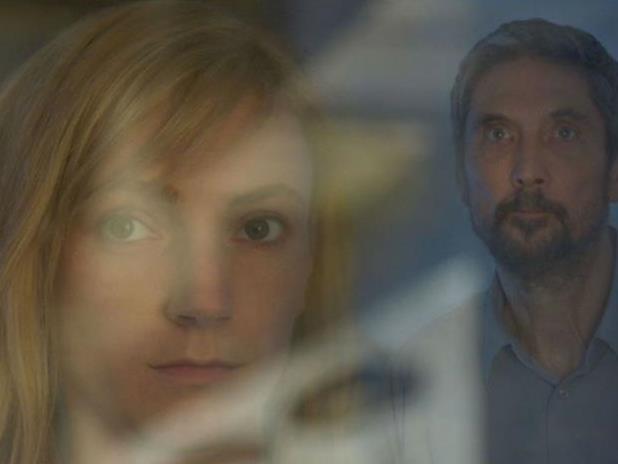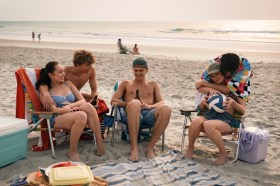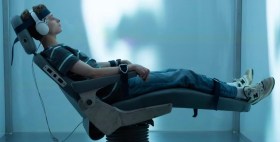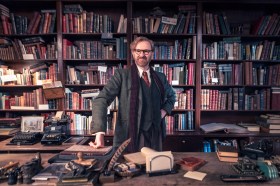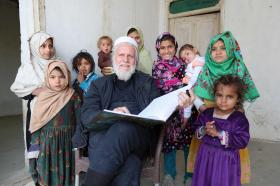A frank and inspiring meeting of minds brilliantly kicks off Screen Womens Series 2, a master class in conjunction with the Sydney Film Festival 2017. Hungarian filmmaker Ildikó Enyedi is the first woman to win the Sydney Film Prize with her involving and unique film, On Body and Soul, which also received the prestigious Berlinale Golden Bear.
On Body and Soul – Testről és lélekről official trailer (2017) Ildikó Eny from FILMARTI Film on Vimeo.
The story charts the slow-burning attraction between two lonely abattoir workers, Endre and Mária who simply cannot connect in the real world as intimately as they do in the dream they mysteriously share, where they are deer in the forest.
She spoke candidly and with passion about her journey as a filmmaker with moderator and filmmaker Miro Bilbrough to an industry audience at the treasury room, Town Hall on Thursday evening, 15th June. Enyedi opened up about past struggles, whilst also giving us a strong sense of her keen intellect, curiosity and creative ambition. Charmingly, Enyedi asked for a show of hands to indicate the audience’s creative roles, wanting a sense of us too.
Enyedi began her career as a concept and media artist. Her first feature My Twentieth Century (1989, SFF 1990) won the Cannes Camera d’Or and was selected among the 10 Best Films of the Year by The New York Times. She has received over 40 international prizes as a director and screenwriter. She has also has lectured at European master classes and the University of Film and Theatrical Arts in Budapest and directed over 35 episodes of the series, Terápia about the lives of young urban adults in Budapest.
On Body and Soul marks Enyedi’s return to feature film making, as writer/director after an 18-year gap. She spoke of the need for writers and directors to carefully select their key collaborators, confiding that in the past she had felt at risk of losing her instinct and making poor choices, seized by the fear that the film or story might not otherwise be realised. Enyedi went on to say there are very talented people who struggle with the pressures of filmmaking. She embraces the complexity, myriad decisions and exhaustive attention to detail that is central to directing. She has an enormous admiration for documentary filmmakers though it is not her art form.
A feverish reader as a teenager, she always wanted to write and looked for different ways to have an impact, to change the world. Enyedi explored philosophy, sociology, economy, sculpting and mathematics as part of an art group with interdisciplinary thinking, Indigo. She went on to film school in Budapest, which she described as not a great fit for her at that time. She was the only female student and it tended to be hierarchical and paternalistic in structure.
Enyedi’s usual method for writing a feature film covers an intensive 18-months. She loves the research period and the process of writing and re-writing; she throws many scenes out and commits fully to that process. However, interestingly this latest film, On Body and Soul, was written in a matter of weeks, ‘a simply joyous experience.’ She discovered her two protagonists and followed them. Nevertheless the script was shelved for some years after the collapse of the Hungarian film industry when for a time no films were made. After finding two wonderful producers (interviewed here) the project came back into focus and found momentum. Enyedi explained some of her thinking behind the story, that she had ‘recurring questions that interest her, about how life should be lived, to not miss it, to live completely’.
Enyedi demands attention to detail, creating what Miro Bilbrough called ‘a film of micro gestures and the quality of the tension – each image is very precise.’ Enyedi talked about a moment where the character wipes breadcrumbs from the counter, which was extremely important. It was lit carefully and she was confident it would speak to the audience, creating an intimate canvas and an intense focus.
She created a wonderful picture of what her close-knit team set out to achieve. It was fascinating to hear how she involves the extended crew in the story, even down to the drivers, ensuring they had a synopsis. It was important ‘each person deeply understood what the film was about, to honour and respect the process and the cast. There was intensive preparation and discussion and a wonderful experience of unity. Everyone was fresh, open to the experience and not stuck in their ways. Somehow we all served the same film.’ Curiously a gaffer on the crew stars in an engaging and recurring cameo as a shop owner who enjoys a relationship with Endre, the factory director.
Enyedi’s casting process was exhaustive, yet instinctual and revealing. She drew male lead Endre, played by Géza Morcsanyi, from outside acting circles, from the publishing world. For this role she sought a particular presence, not necessarily professional acting experience. And as soon as she met him she knew he was right. But the search for the very challenging lead role of Mariya took five months. During this time Géza was the reader opposite auditioning actors, so it was like acting school for him.
Hungarian stage and film actress Alexandra Borbély was initially cast as the sensual pyschologist, a secondary character. But she kept rethinking this until she made the bold decision to recast Borbély as the far more unworldly lead in a play against type. ‘It was a real discovery for the actress, how she built the role. A great actress and an incredible transformation.’ They spent one month working together on the role and then ‘Alexandra became Mariya; after that I didn’t need to tell her anything.’
The film also includes animals: deer that are cast to match the human leads. Enyedi brought the actors to meet the deer and a professional animal trainer worked with the deer for six months. Enyedi says the actors became deer-like. She also described how she framed the deer so that the audience would be with them.
Enyedi believes we can change the world through cinema even though On Body and Soul is a modest production. ‘I didn’t want to make a showy film, but a small film, to honour the story. Not show the work but the simplicity.’ Seeing the film connect with an audience ‘made me feel fully alive again,’ says Enyedi and that vigour was palpable. It was a thrilling master class that offered insights into a sensitive artist with an original vision.
The Screen Women’s Series began last year as collaboration between Film Fatales (Directors), Screen Vixens (Producers) and WIFT NSW (Women in Film and Television). Its aim is to provide inclusive, free and useful events for women working in all areas of the film, television and screen industry to strengthen our networks and expand our skills.
Film Fatales is a diverse community of women filmmakers who meet regularly to mentor each other, share resources, collaborate on projects and build a supportive environment in which to make their films. Film Fatales membership is available to women who have previously directed or co-directed at least one feature-length narrative film, broadcast-length documentary or scripted television episode which has been distributed.
